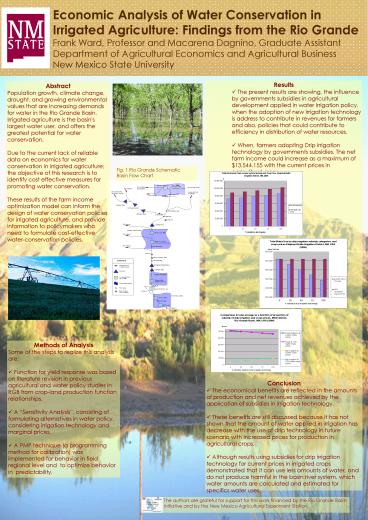Economic Analysis of Water Conservation in - PowerPoint PPT Presentation
1 / 1
Title:
Economic Analysis of Water Conservation in
Description:
Economic Analysis of Water Conservation in Irrigated Agriculture: Findings from the Rio Grande Frank Ward, Professor and Macarena Dagnino, Graduate Assistant ... – PowerPoint PPT presentation
Number of Views:90
Avg rating:3.0/5.0
Title: Economic Analysis of Water Conservation in
1
Economic Analysis of Water Conservation in
Irrigated Agriculture Findings from the Rio
Grande Frank Ward, Professor and Macarena
Dagnino, Graduate Assistant Department of
Agricultural Economics and Agricultural
Business New Mexico State University
- Results
- The present results are showing, the influence
by governments subsidies in agricultural
development applied in water irrigation policy,
when the adoption of new irrigation technology is
address to contribute in revenues for farmers and
also, policies that could contribute to
efficiency in distribution of water resources. - When, farmers adopting Drip irrigation
technology by governments subsidies. The net farm
income could increase as a maximum of 13.544.155
with the current prices in agricultural crops.
Abstract Population growth, climate change,
drought, and growing environmental values that
are increasing demands for water in the Rio
Grande Basin. Irrigated agriculture is the
basin's largest water user, and offers the
greatest potential for water conservation. Due
to the current lack of reliable data on economics
for water conservation in irrigated agriculture
the objective of this research is to identify
cost effective measures for promoting water
conservation. These results of the farm income
optimization model can inform the design of water
conservation policies for irrigated agriculture,
and provide information to policymakers who need
to formulate cost-effective water-conservation
policies.
Fig. 1 Rio Grande Schematic Basin Flow Chart
- Methods of Analysis
- Some of the steps to realize this analysis are
- Function for yield response was based on
literature revision in previous agricultural and
water policy studies in RGB from crop-land
production function relationships. - A Sensitivity Analysis, consisting of
formulating alternatives in water policy,
considering irrigation technology and marginal
prices. - A PMP technique (a programming method for
calibration) was implemented for behavior in
field regional level and to optimize behavior in
predictability.
The authors are grateful for support for this
work financed by the Rio Grande Basin Initiative
and by the New Mexico Agricultural Experiment
Station.































